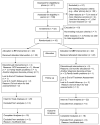Early childhood OCD: preliminary findings from a family-based cognitive-behavioral approach
- PMID: 18356758
- PMCID: PMC2820297
- DOI: 10.1097/CHI.0b013e31816765f9
Early childhood OCD: preliminary findings from a family-based cognitive-behavioral approach
Abstract
Objective: To examine the relative efficacy of family-based cognitive-behavioral therapy (CBT) versus family-based relaxation treatment (RT) for young children ages 5 to 8 years with obsessive-compulsive disorder (OCD).
Method: Forty-two young children with primary OCD were randomized to receive 12 sessions of family-based CBT or family-based RT. Assessments were conducted before and after treatment by independent raters blind to treatment assignment. Primary outcomes included scores on the Children's Yale-Brown Obsessive Compulsive Scale and Clinical Global Impressions-Improvement.
Results: For the intent-to-treat sample, CBT was associated with a moderate treatment effect (d = 0.53), although there was not a significant difference between the groups at conventional levels. For the completer sample, CBT had a large effect (d = 0.85), and there was a significant group difference favoring CBT. In the intent-to-treat sample, 50% of children in the CBT group achieved remission as compared to 20% in the RT group. In the completer sample, 69% of children in the CBT group achieved a clinical remission compared to 20% in the RT group.
Conclusions: Results indicate that children with early-onset OCD benefit from a treatment approach tailored to their developmental needs and family context. CBT was effective in reducing OCD symptoms and in helping a large number of children achieve a clinical remission.
Trial registration: ClinicalTrials.gov NCT00055068.
Conflict of interest statement
Disclosure: The authors report no conflicts of interest.
Figures


Comment in
-
Optimizing cognitive-behavioral therapy for childhood psychiatric disorders.J Am Acad Child Adolesc Psychiatry. 2008 May;47(5):481-482. doi: 10.1097/CHI.0b013e31816a0d8d. J Am Acad Child Adolesc Psychiatry. 2008. PMID: 18438183 No abstract available.
References
-
- Hollingsworth CE, Tanguay PE, Grossman L, Pabst P. Long-term outcome of obsessive-compulsive disorder in childhood. J Am Acad Child Psychiatry. 1980;19:134–144. - PubMed
-
- Swedo SE, Rapoport JL, Leonard HL, Lenane M, Cheslow D. Obsessive compulsive disorders in children and adolescents: clinical phenomenology of 70 consecutive cases. Arch Gen Psychiatry. 1989;46:335–343. - PubMed
-
- Flament MF, Koby E, Rapoport JL, et al. Childhood obsessive-compulsive disorder: a prospective follow-up study. J Child Psychol Psychiatry. 1990;31:363–380. - PubMed
-
- Leonard HL, Lenane M, Swedo SE. Obsessive-compulsive disorder. Child Adolesc Psychiatr Clin N Am. 1993;2:655–665. - PubMed
-
- Piacentini J, Bergman RL, Keller M, McCracken J. Functional impairment in children and adolescents with obsessive-compulsive disorder. J Child Adolesc Psychopharmacol. 2003;13(Suppl 1):S61–S69. - PubMed

